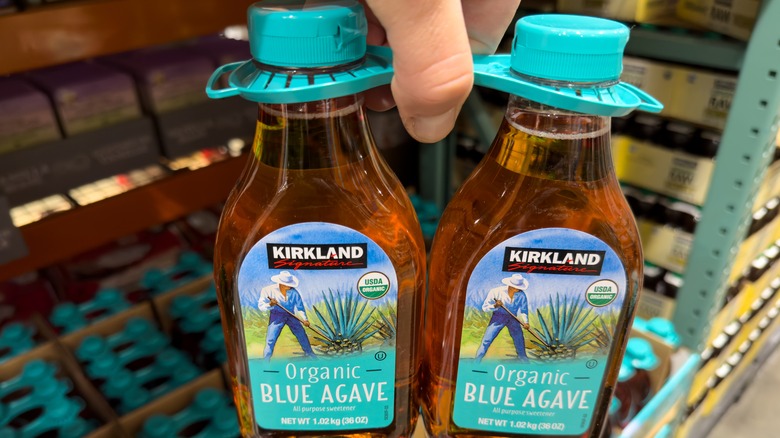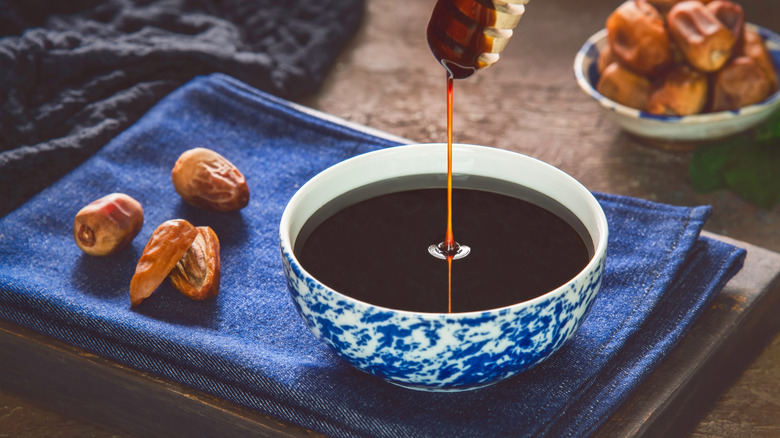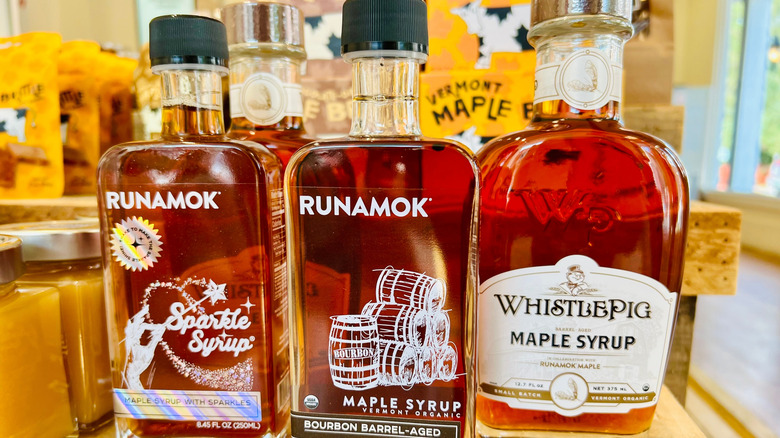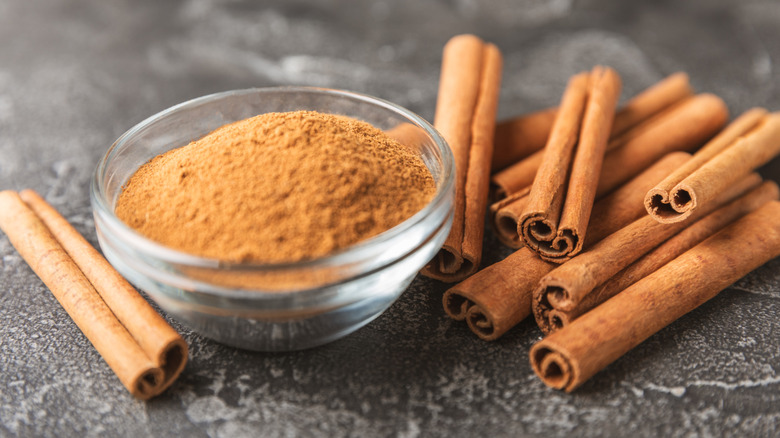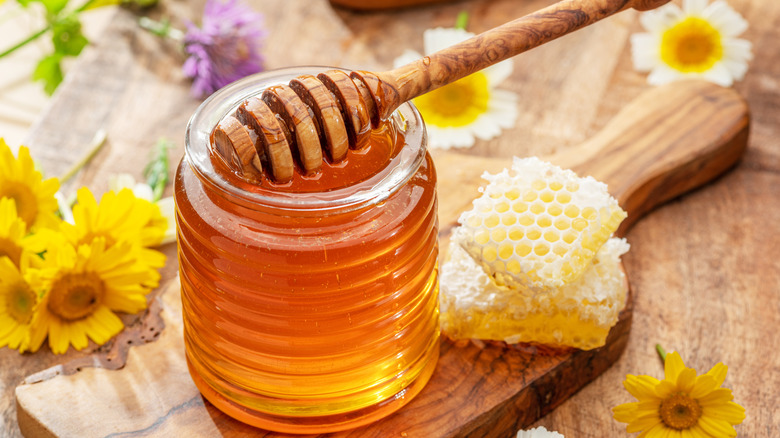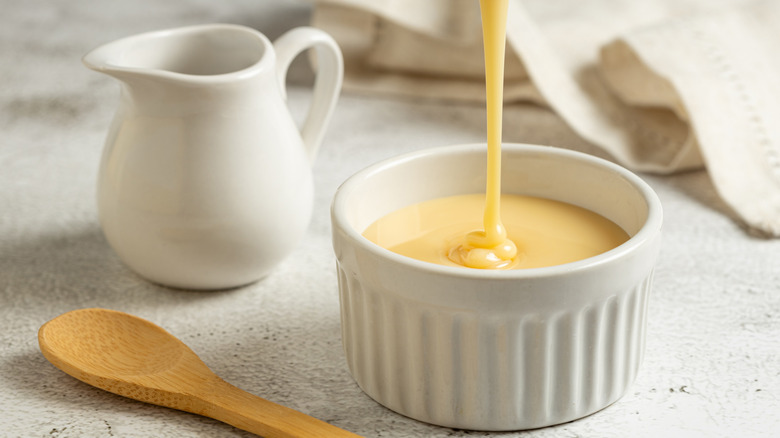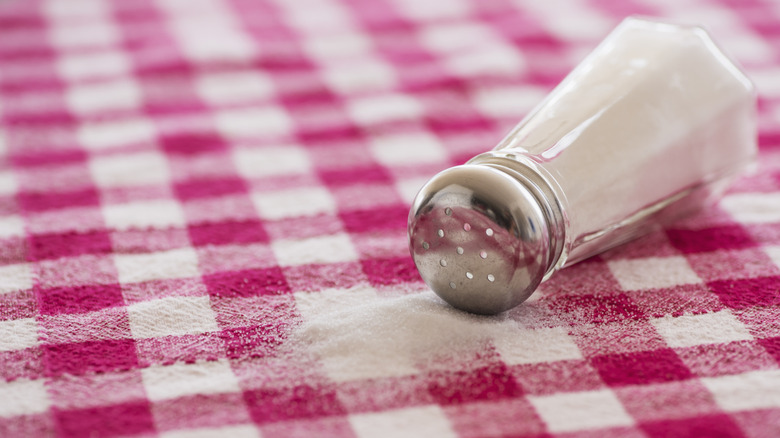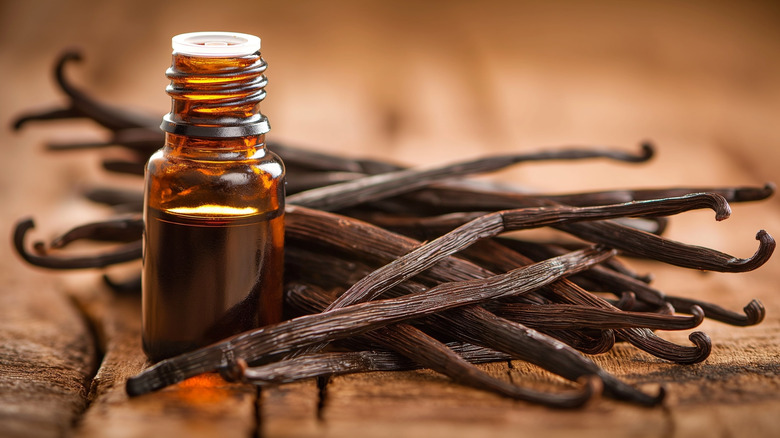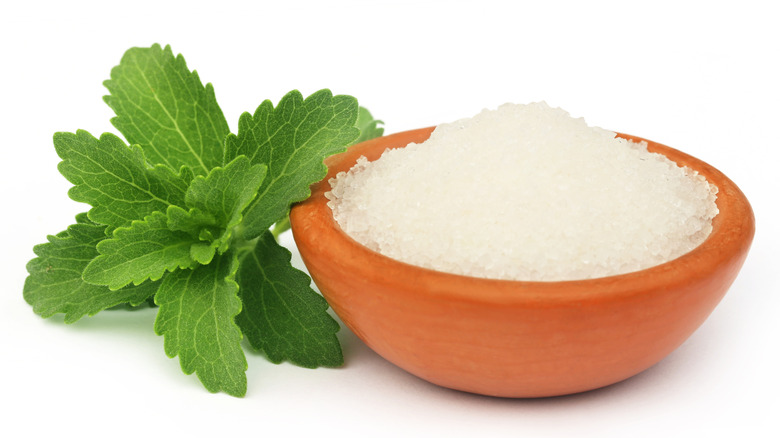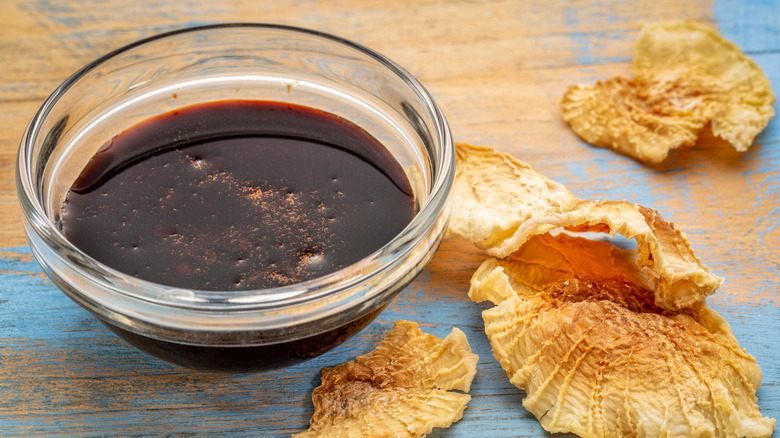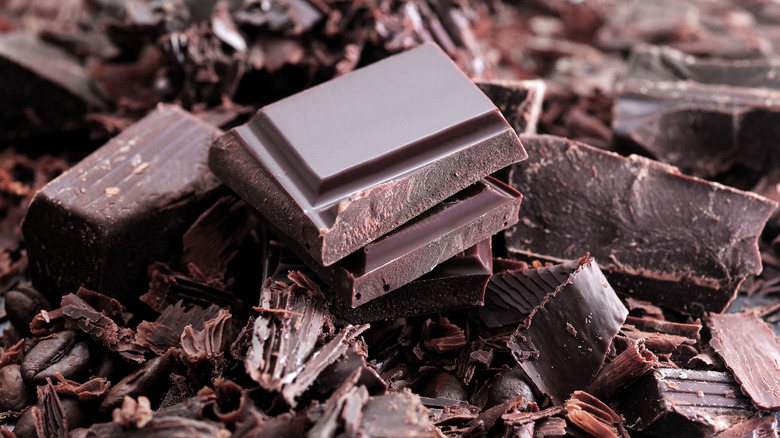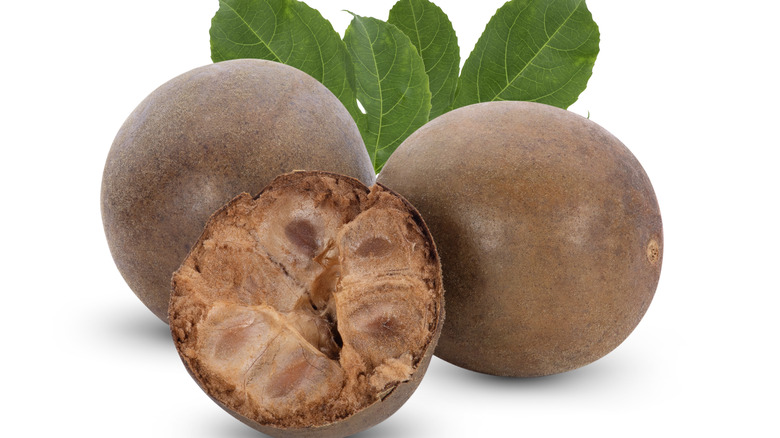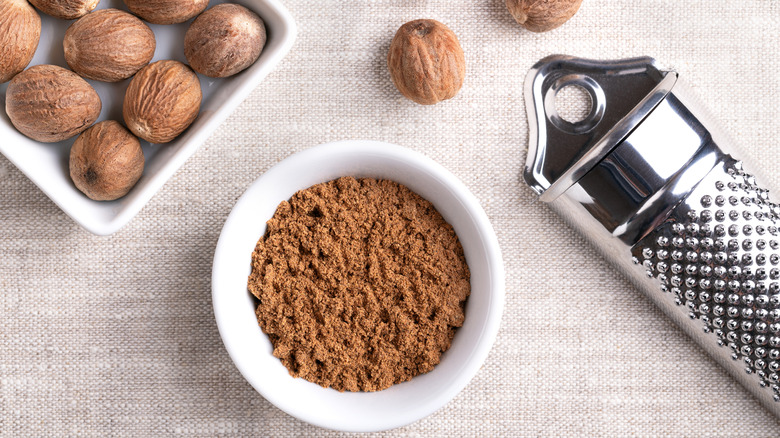13 Ways To Sweeten Your Coffee Without Sugar Or Creamer
We may receive a commission on purchases made from links.
Cream and sugar is the most popular way to add sweetness to coffee. There are ways to shake things up, however, and still sweeten your morning cup of joe without these two coffee staples.
Each of these sweeteners will enhance the taste of coffee not only by sweetening it but also hinting at a variety of unique flavors. Some of them have various health benefits, too, so not only are you enjoying a sweeter cup of coffee, you might be improving health. Many of these alternative sweeteners could already be in your cabinet — and even if they're not, they are available at your local grocery and health food stores, and are generally affordable.
From natural sweeteners to spices and even salt, here are 13 alternatives to creamer and sugar to make your morning cup of joe taste great and still be sweetened.
Agave
So what is agave? Well, for one thing, it's an alternative to sugar. It has many uses for sweetening, and coffee is no exception. Agave syrup has a mild flavor, but due to how sweet it is — about 1.5 times sweeter than regular sugar – you don't have to add as much to your coffee as you would with regular sugar. It also dissolves easily.
There are many health benefits of using agave as a sweetener. Because its sweetness is natural, your blood sugar levels won't rise as much as they would when using regular sugar. The antioxidants in agave are beneficial to your health, including prebiotic fibers that are good for your gut, lowering blood glucose levels, and more. Agave also has compounds known as saponins which can help lower cholesterol — and it has high levels of vitamin B6, which is most useful in breaking down food, and to help maintain your immune and nervous systems. If you like the sweetness and health benefits of agave, this amazing substitute could be the replacement you're looking for.
Dates
Mixing date syrup into your coffee is an excellent way to sweeten it without consuming basic table sugar. Because dates have a lot of natural sugars, using them (in coffee) can satisfy your sugar cravings without raising your blood sugar too much. Dates also have numerous health benefits, including improving gut health and brain function.
Dates can also allow for coffee to have a unique caramel-esque flavor. There's many types of dates with their own flavor qualities that can enhance sweetness of coffee while giving your cup a little extra something. For example, khadrawy dates are a bit tangy, while others, such as khalas dates (popular in the Middle East), have hints of brown sugar. Premade date syrup is available to purchase in stores and Amazon. Making homemade date paste is also quick and easy and requires one other ingredient: water. It takes five to 15 minutes to make and can last up to three months. If you're a fan of caramel and want a healthy way to add it to your coffee, dates are a viable choice.
Maple syrup
Want your coffee to taste like a stack of pancakes and waffles? Add maple syrup to it. Originating from Canada, a drizzle of maple syrup in coffee is a superb way to bring sweetness to your morning brew. Much like dates, there are different kinds of maple syrup that have their own uniqueness. Depending on when maple tree sap is harvested, the syrup gets darker in color and its flavor becomes more intense as time progresses during the season.
Maple syrup has many health benefits as well. It's a healthier substitute for regular sugar. According to a 2024 study, adding maple syrup to coffee can reduce the risk of diabetes and heart disease. Pure maple syrup also has antioxidants and some vitamins and minerals beneficial to your health. There's no doubt, maple syrup will give your cup of coffee the unique sweetness you want.
Cinnamon
Looking for an autumnal way to add sweetness to coffee? Try cinnamon. There are many ways to use cinnamon in coffee. It enhances the flavor and allows for your cup of joe to not only be sweetened but also a bit spicy. Stirring in 1 or 2 teaspoons of ground cinnamon — or even using a cinnamon stick as a stirrer — can enhance the flavor of your coffee and make it taste sweet and comforting.
Ceylon, or true, cinnamon and cassia cinnamon are the most well-known forms that are sold in stores. They each have their own flavor and health benefits. Cassia cinnamon is more commonly found in grocery stores and is cheaper, while Ceylon cinnamon is rarer and more expensive. Ceylon cinnamon has more of a mild and sweet taste while cassia cinnamon is on the spicier side. Both are rich in antioxidants and can boost metabolism. Either way, these cinnamon types are a soothing and tasty addition to your morning cup of coffee.
Honey
There are so many ways to use honey in food and drinks. Of course, sweetening your coffee is one of them. Because honey is so versatile, you can combine it with other flavors to make coffee taste even better.
There are many kinds of honey from all over the world that have unique tastes and qualities — with varying notes of sweetness and texture. Each kind can enhance the flavor of coffee. You can even make honey out of lavender blossoms for an enjoyable lavender taste.
Honey has many health benefits and has also been used to treat certain ailments. Antioxidants in honey have been linked to reduced risk of heart disease, and it might relieve gastrointestinal conditions — not bad for using it to sweeten coffee. However, read the label before buying honey, because it may have sugar or other additives. Also, raw honey straight from the honeycomb might have more health benefits because its natural form is maintained. It's a fantastic sweetener for your coffee any time of day.
Condensed Milk
Vietnamese-style coffee is best known for its intense sweetness. The key to this is condensed milk. Cà Phê Sữa Đá, or iced milk coffee in English, is made by pouring coffee through a special kind of filter called a "phin" and into a cup or mug with condensed milk on the bottom. Vietnamese coffee beans are known for being dark roast and stronger than other kinds of coffee, coming from the robusta coffee plant. Combining it with condensed milk allows for the intense bitterness to be supplemented with a flavorful sweetness.
Condensed milk was used as a sweetener in Vietnam due to fresh milk not being readily available all the way back to the 1850s. Since condensed milk could be stored in a can and had multiple uses, it became a popular alternative and created a new method to sweeten coffee. Because it's very sweet, a little goes a long way to make your cup of coffee taste less bitter.
Salt
Did you know salt can sweeten coffee? An unusual choice, but mixing salt into coffee can help reduce bitterness and even give it a touch of sweetness. Food expert Alton Brown highlighted the use of salt in coffee on an episode of "Good Eats." Brown adds salt to coffee grounds before brewing, but you can also sprinkle it into an already brewed cup. Either way, your coffee will taste a little sweeter.
The reason why coffee tastes sweet when you add salt to it is because it reduces bitterness while enhancing other flavors like sweetness or sourness. Combining salty and bitter flavors causes your brain to perceive the flavor as sweet, which is why coffee tastes sweet when salt is added to it.
Salting coffee isn't a new phenomenon. For instance, in Turkey, salted coffee is a part of a marriage proposal custom. It's also a popular sweetener in beverages in Scandinavia and Taiwan. So go ahead, sweeten your coffee with a pinch of salt, and taste the difference.
Vanilla extract
Vanilla extract has many uses in the kitchen for cooking and baking. One of these is adding some to your coffee. If you're a fan of vanilla, this is an easy and natural way to add that special flavor. Natural vanilla extract has a very low sugar count, so you won't be consuming a lot of added sugar when stirring it in coffee. However, there are some artificial vanilla extracts that do add sugar, so you might want to double-check the label before purchasing.
Vanilla extract on its own has a lot of antioxidants and can balance out the effects of caffeine, since vanilla is a calming agent. You only need a few drops to make your coffee perk up with vanilla flavor. It's also a great add-in for many flavor combinations. And you can even buy your own vanilla-infused coffee grounds for more added flavor.
Stevia
Stevia is a zero-calorie sweetener that comes from the stevia rebaudiana plant. It's a well-known sugar substitute that's also 200 times sweeter than sugar. This makes it a long-lasting sweetener since you would need a lot less of it to make your coffee taste sweet. Adding it to coffee makes it sweeter while also enhancing natural flavors. Stevia comes in many forms, including powdered, granulated, and as a syrup.
The stevia plant originates in Brazil and Paraguay. Indigenous people in those regions have been using it as a sweetener since around the 16th century. Stevia also has some health benefits — it has zero calories and mostly no additives. Replacing sugar with stevia might help prevent high blood pressure, diabetes, and obesity. However, some people find there's a little aftertaste — if you don't mind that, stevia can be an excellent alternative to sugar or creamer in your coffee.
Yacón syrup
Another plant-based syrup you can use to sweeten coffee without sugar or creamer is yacón syrup. Coming from the yacón plant, the syrup is a staple in many South American diets and is known to taste like molasses or caramelized sugar. It's not as sweet as some other syrups, but it gets the job done and is good for those who aren't big fans of overtly-sweet things.
It has also been known to be an alternative to maple syrup. In addition to being low-calorie, yacón syrup is a natural sweetener that comes directly from the plant and has no additives. It has prebiotics and antioxidants, as well as a low glycemic count so it won't spike blood levels during consumption. Yacón syrup can also help with weight loss and is a digestive aid. However, it can also cause digestive discomfort, so proceed with caution when using it in your coffee — it really depends on how your body reacts to it. If you find it does not irritate you and it tastes good, yacón syrup could be an excellent sweet substitution.
Chocolate
Chocolate is an effective way to add flavor and sweetness to coffee without the use of table sugar or creamer. A sprinkle of chocolate melted into your morning java will do the trick. You can also add cocoa powder to coffee grounds prior to brewing to enhance the flavor. There are chocolate-infused coffee grounds available for purchase that can further emphasize that chocolatey flavor. Chocolate even has some health benefits. Less processed chocolate is known to be healthier; dark chocolate's health benefits include increasing heart health, improving brain function, boosting athletic performance, and even fighting diabetes.
Here's a popular thing to do over the past few years: Pour espresso over a bar of chocolate and mix it in after it melts and falls into the cup. Many who have tried the trend have raved about it. Different types of chocolate will give your coffee a rich blend of java notes and chocolatey goodness.
Monk fruit
Monk fruit sweetener, also known as luo han guo, is a natural zero calorie sweetener coming from the Siraitia grosvenorii fruit. It has its origins in China, where Buddhist monks have been using it as a sweetener for 800 years. There are many similarities to stevia, but monk fruit sweetener offers some of its own uniqueness and benefits. It's known to be 150 to 200 times sweeter than regular sugar, so you don't need much to make your coffee sweet. And it has a bit more of a fruity and caramel taste to it.
Monk fruit comes in many forms, including granulated and liquid drops. This sweetener helps improve gut health, has antioxidants, with zero calories and fat. It may be more expensive than regular sugar and other alternatives — considering monk fruit is less commonly grown — but it might be worth a try if you want to sweeten your coffee with something really unique.
Nutmeg
Looking for an earthy way to sweeten your coffee without creamer or sugar? Add nutmeg to it. Nutmeg is often used to sweeten various desserts and beverages, and coffee is no exception. Nutmeg is the perfect combination of sweet and earthy, and it's also slightly tangy. It's a popular sweetener with origins in the Netherlands and Indonesia.
Fresh nutmeg or ground nutmeg can work well, and you can add it either directly to coffee grounds before brewing or stir it into the beverage after brewing. You don't need to add too much nutmeg to your coffee for it to achieve a powerful flavor. Nutmeg is a natural sweetener and has some health benefits. It's rich in antioxidants, has antibacterial properties, helps lower blood sugar, and can potentially relieve pain by improving blood circulation in areas where pain occurs. Nutmeg is an excellent way to spice up (and sweeten up) your morning cup of joe while giving it an interesting flavor.


